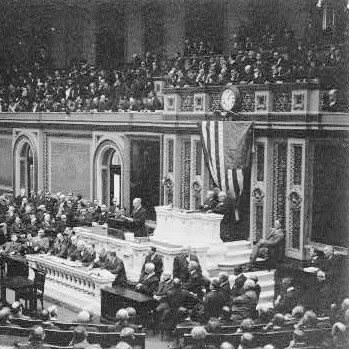Woodrow Wilson and Poland’s Independence
Chapter 12: The Fourteen Points
Once the New Year commenced, Wilson began to work on his announcement of the U.S. war aims, which became known as The Fourteen Points
speech. In the first draft of the speech, written 5 January 1918, Wilson’s section on Poland was an exact copy of the Inquiry’s recommendation for an independent and democratic Poland with access to the sea. However, in a later draft written that day, Wilson wrote the following
as a completely new statement in regards to Poland:
An independent Polish state to be established whose political and economic independence and territorial integrity shall be guaranteed by international covenant; which shall include the territories inhabited by indisputably Polish populations; and which shall be accorded a free and secure access to the Sea.
Why did Wilson leave out mention of a democratic Poland? Wilson’s decision to omit that term is not known. The President may have decided that the time was not right to demand a democratic Polish state. The main focus may have been an independent nation of Polish people possessing free access to the sea.

Photo:Harris & Ewing, photographer. Woodrow Wilson. Addressing Congress. District of Columbia United States Washington D.C.. [Between 1917 and 1919] Photograph. https://www.loc.gov/item/2016854408/.
Before completing a final draft of the Fourteen Points, on 6 January 1918, Wilson
met with Colonel House for his input. The Colonel brought with him a memorandum
authored by the Polish National Committee to be included in the Inter-Allied Conference
House attended the previous autumn. The National Committee was very specific in the
territory they desired, such as Silesia and a portion of the Baltic Coast. They also stated a
Czech state should be created. Wilson and House agreed not to be as specific as this
memorandum. The two men therefore worked with the statement Wilson
wrote the day before. However, the word should
replaced the words must
and
shall
throughout the statement. House convinced Wilson that Americans might not
be willing to support the war in order to readjust European territory. Therefore, he felt it
was wise to use should
in such points, with the exception of Belgium.
On the 5th of January, British Prime Minister David Lloyd George gave a
statement of war aims which included an independent Polish nation. Three days later, Wilson delivered his Fourteen Points. The Thirteenth Point declares that a new independent state in Poland should
be created with access to the sea. Paderewski greatly appreciated Point Thirteen.
Germany, however, did not accept the Thirteenth Point. Such acceptance meant the loss of the Russian partition they captured during the war. It also meant losing the partition they had controlled since 1795. Germany stubbornly kept this position until it accepted complete military defeat on 11 November 1918.